Nvidia Corp. has reportedly acquired Gretel Labs Inc., a startup specializing in synthetic data generation, in a deal valued in the nine figures. According to Wired, citing “two people with direct knowledge of the deal,” the purchase price exceeded Gretel’s most recent valuation of $320 million.
Founded in 2019, Gretel provides a synthetic data platform that enables organizations to generate artificial datasets that mimic real-world data while preserving privacy. By leveraging advanced generative models, the platform ensures that synthetic data retains the statistical properties of real datasets, making it valuable for AI and machine learning applications.
Gretel’s technology supports various data types, including structured tabular data, time-series data, and unstructured text. This enables businesses to safely share, analyze, and develop AI models without exposing sensitive or proprietary information. The platform also features an application programming interface (API) for seamless integration into existing workflows, allowing developers to generate and customize synthetic datasets on demand. Additionally, users can fine-tune the balance between data fidelity and anonymization, guided by built-in privacy controls.
Additionally, Gretel offers tools for data transformation and augmentation, allowing users to enhance, filter, and reshape datasets for specific use cases.
Prior to its reported acquisition, Gretel had raised $65.5 million across three funding rounds, including a $50 million round in 2021. Its investors include Anthos Capital LP, Greylock, Moonshots Capital, S32 Pty. Ltd., and Village Global LP.
If officially confirmed, Nvidia’s acquisition of Gretel aligns with the brand’s broader AI strategy, particularly in addressing data scarcity and privacy concerns. By integrating Gretel’s technology, Nvidia aims to provide developers with enhanced tools for generating realistic, privacy-preserving datasets—critical for training and fine-tuning AI models across various applications. This acquisition would also complement Nvidia’s existing synthetic data initiatives, which focus on generating training data for large language models.



Discussion about this post